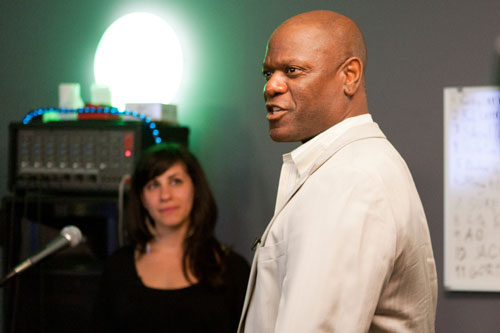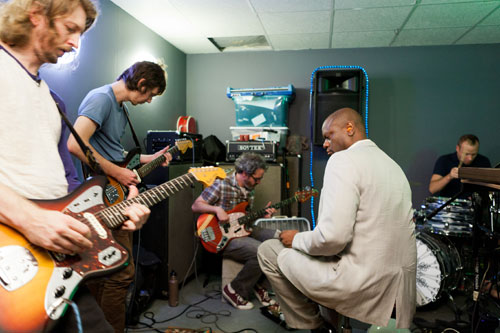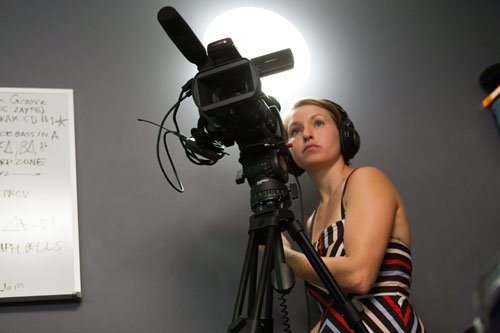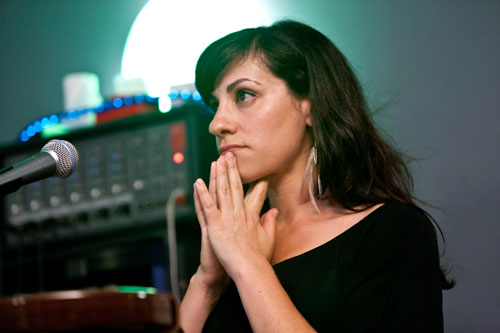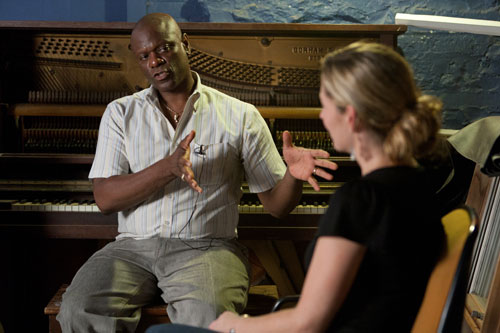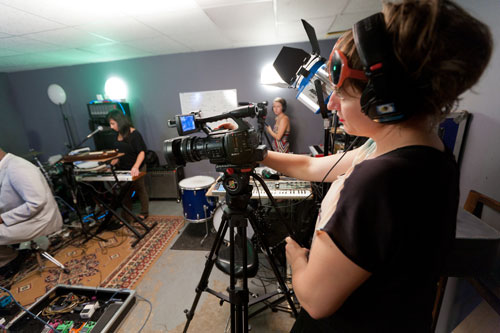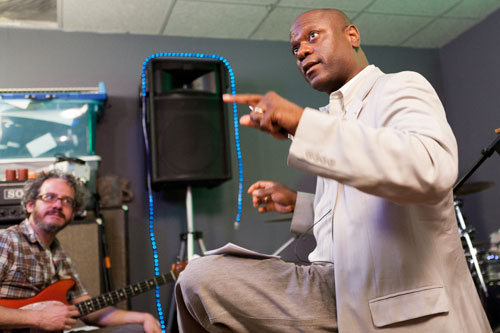Banded: Behind the Making of a Song
Sweltering and cramped practice spaces are nothing new for Boston's working and gigging bands. But in recent months, rehearsal rooms for five local groups featured a decidedly different feel. The studios were still hot, but sweating along with players were several Berklee faculty members, listening to sessions and offering industry-proven insight about the songwriting and music-making process.
The result: collaborative composition at its best.
Banded(Opens in a new window), a PULSE Music Method production, chronicles the work of five local bands—some featuring Berklee students, alumni, and staff—as they craft an original composition, with mentorship from selected faculty.
Songwriting assistant professor Mark Simos was paired with Americana-influenced Tumbleweed Company(Opens in a new window). On a recent night at the band's Brighton digs, Simos helped Tumbleweed find the narrative arc of its song "Old North Wind" in a line that was previously buried. "I feel like that was a kind of breaking moment for us working together," he said. "We made room for that line; we put some space around it in terms of phrasing and instrumental arrangements and it really sort of came alive."
The band was impressed. "I was amazed at his ability to not only come up with suggestions but to communicate the ideas he has for the song," said Dana Osterling, a Berklee alumna who sings and plays cello. "It's really nice to have someone who's removed from most of the writing process to come in and see what they hear. And since he does have such an incredible ear and great instincts, it's been nice to have an outside party telling us: 'This is what I think could be a little different. This is what I think sounded good. This is where you could go next.'
Along with the Simos/Tumbleweed pairing, psychedelic rockers Ghost Box Orchestra(Opens in a new window) and world soul band Zili Misik(Opens in a new window) were matched up with music production and engineering professor Prince Charles Alexander; indie pop duo Aloud(Opens in a new window) with composition professor Marti Epstein; and the indie-baroque Michael J. Epstein Memorial Library(Opens in a new window) with associate liberal arts professor Linda Chase. The PULSE team selected the bands among 50 contenders and then tapped the professors to mentor them.
PULSE—which educates underserved youth nationwide through an innovative, online model based on the Berklee curriculum—will use the footage for online teaching material as well as to create a feature-length documentary about the music-making process. On October 6, the bands will unveil their songs at a concert at the Brighton Music Hall, preceded by a panel discussion with the musicians and participating faculty.
When it came time to produce a composition unit for online teaching, PULSE—inspired by Berklee's strong ensemble curriculum—hatched a plan to commission local Boston gigging bands to write a song and document the process. The idea is to provide PULSE students with role models, to help them overcome social fears of creating or joining a band, and to connect all aspects of PULSE's theory curriculum to performing with an actual band, said Audrey Harrer, '07, creative manager, multimedia for PULSE, who studied film scoring and composition at Berklee.
As a means to accomplishing these goals, the finished product will be uncharted territory of sorts. "The thing that's really fascinating about the project is that there's nothing really like this," said Harrer. "There are tons of band documentaries and films about music, but nothing about the process; it's always in retrospect."
Collaborative Composition
Alexander sat in the center of a Dorchester practice room, surrounded by Ghost Box Orchestra's musicians as they pumped out free-ranging psychedelic grooves rooted in a melody. The group chose a quieter, slower song, "Desert Lights," for critique. "It's a challenge for us to do a quieter song at a slower pace and see what we can do with something more sparse," said vocalist/guitarist Jeremy Lassetter. "We knew we'd need a little help or guidance with it."
Alexander was impressed with the journey the song took him on, and advised the musicians to utilize the melody even more as an anchor. "I kept looking for that melody to see where it was and it kept coming back. I realized at the end of the piece that a really good story had unfolded that had a beginning, middle, and end, and some climaxes," he said.
While Simos's musical sensibilities were similar to Tumbleweed Company's, Alexander's own musical journey—informed by soul, funk, disco, and hip-hop—looks very different on paper from Ghost Box Orchestra's. But that didn't pose a challenge for Alexander, who sees a common thread in all music. "When I listen to a piece of music, I don't really draw on musical sensibilities as much as compositional sensibilities," he said. "Very often when something touches me, it's because it does have the elements of being able to tell a good story."
Meanwhile, Epstein—an avant-garde modern composer who writes mostly chamber music—was at first skeptical she could mentor an indie-pop band. "I was out of my comfort zone, at least initially," she said of working with Aloud, which features Berklee alumni. "The trick was for me to find general musical things that are true for all different styles of music, and try to coach them and comment from that perspective."
It turned out there were many points of connection. Aloud wanted to write for a brass ensemble, an area of expertise for Epstein, who helped them with notation. She also coached them on the bridge, recommending they start quietly and build dynamically, and to embrace the dissonant voicing of the second chord.
Along with benefiting from the expert advice themselves, band members and their Banded mentors can see how Banded will help aspiring musicians in their musical journeys.
"I think about what if I had been able to hear Led Zeppelin and understand the behind the scenes of how 'Stairway to Heaven' was recorded or watch Pink Floyd do The Dark Side of the Moon," said Nazli Green, administrative assistant for PULSE who plays percussion and keys for Ghost Box. "How did they create the song? What elements were built together? Did it start as a theme? This can be a vehicle to show how the parts come together."
"I think being able to peer under the hood of a musically collaborative situation is great for anyone who's trying to do this," said Alexander.
Tumbleweed vocalist/guitarist Ryan Toll, a music education major, sees Banded as a way to demystify the experience of being in a band, especially for incoming Berklee students.
"When you get to Berklee, you're trying to find groups and bands to work with so the more you know how to work with other people and how to write a song, the better," he said. "I wish I would have seen something like this when I came to Berklee. I feel like we would have started Tumbleweed Company a lot sooner."
Beyond serving as a PULSE tool, perhaps the project could inspire something similar to take place in the classroom, Harrer mused. "It would be awesome for Berklee to start thinking about using this as a classroom idea—a course where you work with [existing student] bands versus bands [assembled for a class]."
Epstein is already thinking of ways to connect the value of Banded to her classroom.
"I'm going to try to be more sensitive to the different styles of music of my students," she said, noting she may add several new genres to her teaching palette to enhance her lesson plans.
Meanwhile, in off-campus practice spaces clustered around Boston, there are five rising local bands, already incorporating the lessons they learned, taking such genre-transcending insights as guides for their next projects.

